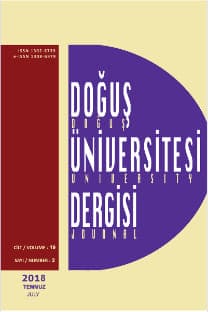FISHER ETKİSİNİN TÜRKİYE VERİLERİ İLE TESTİ
Faiz Oranı, Enflasyon, Fisher Etkisi, Kısıtsız Hata Düzeltme Modeli, Eşbütünleşme Analizi, Ardl, Sınır Testi, Kritik Sınır Değerleri
THE ANALYSIS OF FISHER EFFECT USING TURKISH DATA
Interest rate, inflation, Fisher effect, unrestricted error correction model, cointegration analysis, ARDL, bounds testing, critical value bounds,
___
- ATKINS, F.J. (1989). Co-integration, error correction and the Fisher effect, Applied Economics, 21, pp.1611-1620.
- ATKINS, F. & SERLETIS, A. (2003). Bound Tests of the Gibson Paradox and the Fisher Effect: Evidence from Low-Frequency International Data, The Manchester School, 71(6), pp.673-679.
- BERUMENT, H. & JELASSI, M.M. (2002). The Fisher hypothesis: a cross-country analysis, Applied Economics, 34, pp.1645-1655.
- BEWLEY, R. A. (1979). The Direct Estimation of the Equilibrium Response in a Linear Dynamic Model, Economics Letters, .3, pp.357-61.
- BONHAM, C. S. (1991) Correct Cointegration Test of the Long Run Relationship Between Nominal Interest and Inflation, Applied Economics, 23, pp.1487-1492.
- ENGLE, R.F. & GRANGER, C.V.J. (1987). Cointegration and Error Correction: Representation, Estimation, and Testing, Econometrica, 55, pp.251-276.
- DUTT, S. D. & GHOSH, D. (1995). The Fisher Hypothesis: Examining the Canadian Experience, Applied Economics, 27, pp.1025-1030.
- GARCIA, M.G.P. (1993) The Fisher effect in a signal exraction frameworkt, Journal of Development Economics, 41, pp.71-93.
- GRANVILLE, B. & MALLICK, S. (2004). Fisher hypothesis: UK Evidence over a century, Applied Economics, 25, pp.839-843.
- HARRIS, R. (1995). Using Cointegration Analysis in Econometric Modelling, Prentice Hall, London, New York.
- HAWTREY, K.M. (1997). The Fisher Effect and Australian Interest Rates, Applied Financial Economics Letters, 11, pp.87-90.
- INDER, B. & SILVAPULLE, P. (1993). Does the Fisher Effect Apply in Australia?, Applied Economics, 25, pp.839-843.
- JACQUES, K. (1995). Unit Roots, Interest Rate Spreads and Inflation Forecasts, Applied Economics, 27, pp.605-608.
- JOHANSEN, S. (1988) Statistical analysis of cointegration vectors, Journal of Economic Dynamics and Control, 12(1), pp.231-54.
- JOHANSEN, S. & JUSELIUS, K. (1990). Maximum likelihood estimation and inference on cointegration with application to the demand for money, Oxford Bulletin of Economics and Statistics, 52, pp.69-206.
- JUNTTILA, J. (2001). Testing an Augmented Fisher Hypothesis for a Small Open Economy: The Case of Finland, Journal of Macroeconomics, 23(4), pp.577-599.
- KOUSTAS, Z. & SERLETIS, A. (1999). On the Fisher Effect, Journal of Monetary Economics, 44, pp.105-130.
- KREMERS, J.J.M, ERICSSON, N.L. & DOLADO, J.J. (1992). The Power of Cointegration Tests, Oxford Bulletin of Economics and Statistics, 54, pp.325- 348.
- MAH, J. S. (2000). An Empirical Examination of the Disaggregated Import Demand of Korea – the Case of Information Technology Products, Journal of Asian Economics, 11, pp.237-244.
- MISHKIN, F.S. (1992). Is the Fisher Effect for Real? A Reexamination of the Relationship Between Inflation and Interest Rates, Journal of Monetary Economics, 30, pp.195-215.
- MISKIN, F.S. & SIMON, J. (1995). An empirical examination of the Fisher effect in Australia, Economic Record, 71, pp.217-29.
- OLEKALNS, N. (1996) Further evidence on the the Fisher effect, Applied Economics, 28, pp.851-856.
- PESARAN, M. H. & PESARAN, B. (1997). Working with Microfit 4.0, Interactive Econometric Analysis, Oxford University Press, Oxford.
- PANOPOULOU, E. (2005). A Resolution of the Fisher Effect Puzzle: A Comparison of Estimators, IIIS Discussion Paper No. 67. (http://www.tcd. ie/iiis/Discussion%20Paper%20pdfs/iiisdp67.pdf)
- PESARAN, M.H. & SHIN, Y. (1999). An Autoregressive Distributed Lag Modelling Approach to Cointegration Analysis”, in (ed) S. Storm, Econometrics and Economic Theory in the 20th Century, The Ragnar Frisch Centennial Symposium, chapter 11, Cambridge Univ. Press, Cambridge. (http://www.econ.cam.ac.uk/faculty/pesaran/ardl.pdf)
- PESARAN, M.H., SHIN, Y. & SMITH, R. J. (2001). Bound Testing Approaches to the Analysis of Long Run Relationships, Journal of Applied Econometrics, special issue, 16, pp.289-326. (http://www.econ.cam.ac.uk/faculty/pesaran /pss1r1.pdf)
- RAHBEK, A. & MOSCONI, R. (1999). Cointegration Rank Inference with Stationary Regressors in VAR Models, Econometrics Journal, 2, pp.76-91.
- THORNTON, J. (1996) The adjustement of nominal interest rates in Mexico: a study of the Fisher effect, Applied Economics Letters, 3, pp.255-257.
- WALLACE, M.S. & WARNER, J.T. (1993) The Fisher Effect and the Term Structure of Interest Rates: Test of Cointegration, Review of Economics and Statistics, 75, pp.320-324.
- ISSN: 1302-6739
- Yayın Aralığı: 2
- Başlangıç: 2000
- Yayıncı: Doğuş Üniversitesi
ÖRGÜTSEL YURTTAŞLIK DAVRANIŞI: KAVRAMSAL GELİŞİMİ İLE KİŞİSEL VE ÖRGÜTSEL ETKİLERİ
Modeling, Analysis and Simulation of Simple One Machine-Two Product System Using Petri Nets
Quantifying International Openness in Turkey, 1965-1995
ROL BELİRSİZLİĞİ, ROL ÇATIŞMASI, İŞ TATMİNİ VE PERFORMANS ARASINDAKİ İLİŞKİLER
Adnan CEYLAN, Yıldırım Hüseyin ULUTÜRK
KÜRESELLEŞME: NE KADAR TEK BOYUTLU?
TÜRKİYE’NİN DIŞA AÇILMA ORANININ ÖLÇÜMÜ, 1965-1995
Rol Belirsizliği, Rol Çatışması, İş Tatmini ve Performans Arasındaki İlişkiler
Adnan CEYLAN, Yıldırım Hüseyin ULUTÜRK
TÜRKİYE - AVRUPA BİRLİĞİ AB İLİŞKİLERİ SÜRECİNDE KAMUOYUNUN TUTUMU VE DEĞERLENDİRİLMESİ
Türkiye Avrupa Birliği (AB) İlişkileri Sürecinde Kamuoyunun Tutumu ve Değerlendirilmesi
